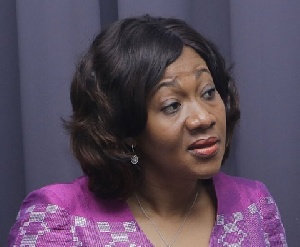 Executive Director of Institue of Economic Affairs, Mrs. Jean Mensa
Executive Director of Institue of Economic Affairs, Mrs. Jean Mensa
The governing National Democratic Congress (NDC) has not officially communicated its decision to the Institute of Economic Affairs (IEA) to boycott this year’s presidential debates, Executive Director of the think tank, Mrs Jean Mensa has said.
A statement signed by the NDC’s General Secretary, Mr Johnson Asiedu Nketiah, said the party, “at its Functional Executive Committee (FEC) meeting on Tuesday, June 21, 2016, decided not to participate in any debate to be organised by the Institute of Economic Affairs (IEA), as far as it is related to the 2016 general elections”.
“All party structures (especially the youth and women's wings), are to take note and comply accordingly,” the statement added.
Deputy General Secretary of the NDC, Mr Koku Anyidoho hinted at the boycott a few weeks ago. According to him, the IEA disrespected the party’s National Organiser, Mr Kofi Adams, as well as the NDC’s structures, when it sidelined them to discuss the debate with some government functionaries rather than party officials.
But in an interview with Chief Jerry Forson on Accra100.5FM’s breakfast show Ghana Yensom, Mrs Mensa said her office had not been officially informed of the boycott.
“We have received nothing,” she crisply told host Jerry Forson when asked if there had been any correspondence announcing the boycott.
However, she was certain the NDC’s boycott would not take anything away from the debate originally intended for parties with parliamentary representation – the New Patriotic Party (NPP), People’s National Convention (PNC), Convention People’s Party (CPP), and the National Democratic Congress (NDC).
“The whole idea is to promote issues. … We must understand the purpose of the debate – it is not for the IEA; it is for the good people of this country. So, it’s very important that everyone understands that,” Mrs Mensa added.
She continued that such platforms offered the electorate – particularly those who are not “die-hard” supporters of political parties – an opportunity to find out “what each party stands for, what each party’s vision is, how they wish to govern the nation”, in order to make an “informed choice”.
In her view, debates were also a key part of the democratic path Ghana had chosen, as it would allow for politicians to answer to voters on their actions or intents, saying: “Considering this whole academic exercise, if there is no accountability, then there is no need to carry on that path, so the country does not waste money on elections. Once every four years, it is essential that persons wanting to become leaders become accountable to the people and determine how they are going to govern and what they are going to do for us to improve our lot. They must convince us.”